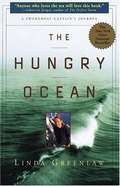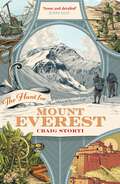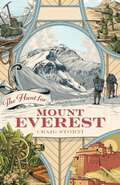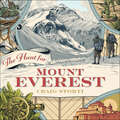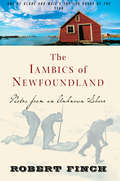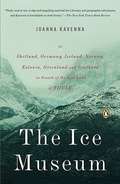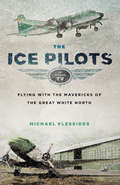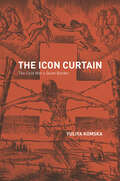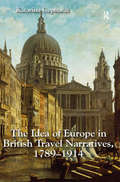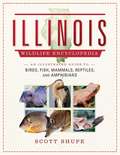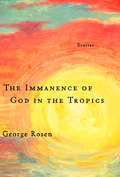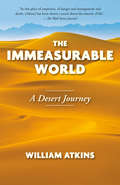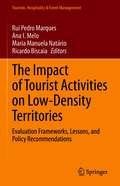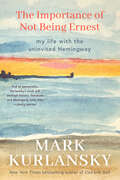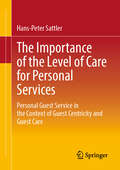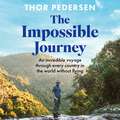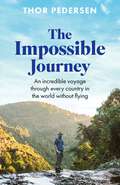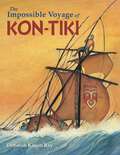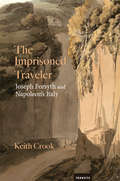- Table View
- List View
The Hungry Eye: Eating, Drinking, and European Culture from Rome to the Renaissance
by Leonard BarkanAn enticing history of food and drink in Western art and cultureEating and drinking can be aesthetic experiences as well as sensory ones. The Hungry Eye takes readers from antiquity to the Renaissance to explore the central role of food and drink in literature, art, philosophy, religion, and statecraft.In this beautifully illustrated book, Leonard Barkan provides an illuminating meditation on how culture finds expression in what we eat and drink. Plato's Symposium is a timeless philosophical text, one that also describes a drinking party. Salome performed her dance at a banquet where the head of John the Baptist was presented on a platter. Barkan looks at ancient mosaics, Dutch still life, and Venetian Last Suppers. He describes how ancient Rome was a paradise of culinary obsessives, and explains what it meant for the Israelites to dine on manna. He discusses the surprising relationship between Renaissance perspective and dinner parties, and sheds new light on the moment when the risen Christ appears to his disciples hungry for a piece of broiled fish. Readers will browse the pages of the Deipnosophistae—an ancient Greek work in sixteen volumes about a single meal, complete with menus—and gain epicurean insights into such figures as Rabelais and Shakespeare, Leonardo and Vermeer.A book for anyone who relishes the pleasures of the table, The Hungry Eye is an erudite and uniquely personal look at all the glorious ways that food and drink have transfigured Western arts and high culture.
The Hungry Ocean: A Swordboat Captain's Journey
by Linda GreenlawAn account of the month that Greenlaw spent on board her 100-foot boat with 5 men, covering over 1000 miles, with the hope of taking back 50,000 pounds of fish.
The Hunt for Mount Everest
by Craig StortiThe height of Mt. Everest was first measured in 1850, but the closest any westerner got to Everest during the next 71 years, until 1921, was 40 miles. The Hunt for Mt. Everest tells the story of the 71-year quest to find the world's highest mountain. It's a tale of high drama, of larger-than-life characters-George Everest, Francis Younghusband, George Mallory, Lord Curzon, Edward Whymper-and a few quiet heroes: Alexander Kellas, the 13th Dalai Lama, Charles Bell. A story that traverses the Alps, the Himalayas, Nepal and Tibet, the British Empire (especially British India and the Raj), the Anglo-Russian rivalry known as The Great Game, the disastrous First Afghan War, and the phenomenal Survey of India - it is far bigger than simply the tallest mountain in the world. Encountering spies, war, political intrigues, and hundreds of mules, camels, bullocks, yaks, and two zebrules, Craig Storti uncovers the fascinating and still largely overlooked saga of all that led up to that moment in late June of 1921 when two English climbers, George Mallory and Guy Bullock, became the first westerners-and almost certainly the first human beings-to set foot on Mt. Everest and thereby claimed the last remaining major prize in the history of exploration.With 2021 bringing the 100th anniversary of that year, most Everest chronicles have dealt with the climbing history of the mountain, with all that happened after 1921. The Hunt for Mt. Everest is the seldom-told story of all that happened before.
The Hunt for Mount Everest
by Craig Storti"This book would be enjoyed by those seeking knowledge of Everest beyond theclimbing narratives, as well as those who appreciate the details of navigation and exploration."— Booklist The height of Mt. Everest was first measured in 1850, but the closest any westerner got to Everest during the next 71 years, until 1921, was 40 miles. The Hunt for Mt. Everest tells the story of the 71-year quest to find the world's highest mountain. It's a tale of high drama, of larger-than-life characters-George Everest, Francis Younghusband, George Mallory, Lord Curzon, Edward Whymper-and a few quiet heroes: Alexander Kellas, the 13th Dalai Lama, Charles Bell.A story that traverses the Alps, the Himalayas, Nepal and Tibet, the British Empire (especially British India and the Raj), the Anglo-Russian rivalry known as The Great Game, the disastrous First Afghan War, and the phenomenal Survey of India - it is far bigger than simply the tallest mountain in the world. Encountering spies, war, political intrigues, and hundreds of mules, camels, bullocks, yaks, and two zebrules, Craig Storti uncovers the fascinating and still largely overlooked saga of all that led up to that moment in late June of 1921 when two English climbers, George Mallory and Guy Bullock, became the first westerners-and almost certainly the first human beings-to set foot on Mt. Everest and thereby claimed the last remaining major prize in the history of exploration.With 2021 bringing the 100th anniversary of that year, most Everest chronicles have dealt with the climbing history of the mountain, with all that happened after 1921. The Hunt for Mt. Everest is the seldom-told story of all that happened before.
The Hunt for Mount Everest
by Craig StortiThe height of Mt. Everest was first measured in 1850, but the closest any westerner got to Everest during the next 71 years, until 1921, was 40 miles. The Hunt for Mt. Everest tells the story of the 71-year quest to find the world's highest mountain. It's a tale of high drama, of larger-than-life characters-George Everest, Francis Younghusband, George Mallory, Lord Curzon, Edward Whymper-and a few quiet heroes: Alexander Kellas, the 13th Dalai Lama, Charles Bell. A story that traverses the Alps, the Himalayas, Nepal and Tibet, the British Empire (especially British India and the Raj), the Anglo-Russian rivalry known as The Great Game, the disastrous First Afghan War, and the phenomenal Survey of India - it is far bigger than simply the tallest mountain in the world. Encountering spies, war, political intrigues, and hundreds of mules, camels, bullocks, yaks, and two zebrules, Craig Storti uncovers the fascinating and still largely overlooked saga of all that led up to that moment in late June of 1921 when two English climbers, George Mallory and Guy Bullock, became the first westerners-and almost certainly the first human beings-to set foot on Mt. Everest and thereby claimed the last remaining major prize in the history of exploration.With 2021 bringing the 100th anniversary of that year, most Everest chronicles have dealt with the climbing history of the mountain, with all that happened after 1921. The Hunt for Mt. Everest is the seldom-told story of all that happened before.(P) 2020 Hodder & Stoughton Ltd
The ISIS Hostage: One Man's True Story Of Thirteen Months In Captivity
by David Young Puk DamsgardDanish photographer Daniel Rye was taken capture by the Islamic State for thirteen months —this is his story. In May 2013, Daniel Rye traveled to Syria for a planned three-day trip to photograph the effects of the war on civilians. While there, he was captured by ISIS and held for a nightmarish thirteen months. Held alongside hostages of 13 different nationalities, Daniel was starved and tortured, and he was the last of the hostages to leave captivity alive. Walking readers through Daniel’s everyday experiences in captivity, this compelling account also follows Daniel’s family and their nerve-wracking negotiations with his kidnappers, tracing their horrifying journey through impossible dilemmas and offering a rare glimpse into the secret world of the investigation launched to locate and free not only Daniel, but also the American freelance journalist and fellow hostage James Foley. Capitalizing on a Danish legal loophole, Daniel’s friends and family were ultimately able to raise $2.2 million to secure his release. Written with Daniel’s full cooperation and based on interviews with former fellow prisoners, jihadists, and key figures who worked behind the scenes to secure his release, The ISIS Hostage offers a compelling window into life under the veil of the Islamic State and tells a moving and terrifying story of friendship and survival.
The Iambics of Newfoundland: Notes from an Unknown Shore
by Robert FinchFor nearly a decade, Robert Finch traveled around the "edge of North America" — the stunning yet seriously inhospitable island of Newfoundland. Here, he chronicles the people, geography, and wildlife of this remote and lovely place. In beautifully written essays, sketches, and stories, Finch roams from verdant valleys to the rocky cliffs of Cape Spear, from Sandy Cove to Squid Tickle, from the steep streets of historic St. John's to the moss–covered tundra of the southern coast. As he describes the land, he brings to life the island's diverse array of characters — newcomers and old–timers, fisherman, hunters, hitchhikers, and children. Most of all, The Iambics of Newfoundland shows readers the island itself — an ancient place tucked between provinces, languages, and cultures — struggling to find a footing in the modern world.
The Ice Balloon
by Alec WilkinsonIn this grand and astonishing tale, Alec Wilkinson brings us the story of S. A. Andrée, the visionary Swedish aeronaut who, in 1897, during the great age of Arctic endeavor, left to discover the North Pole by flying to it in a hydrogen balloon. Called by a British military officer "the most original and remarkable attempt ever made in Arctic exploration," Andrée's expedition was followed by nearly the entire world, and it made him an international legend. The Ice Balloon begins in the late nineteenth century, when nations, compelled by vanity, commerce, and science, competed with one another for the greatest discoveries, and newspapers covered every journey. Wilkinson describes how in Andrée several contemporary themes intersected. He was the first modern explorer--the first to depart for the Arctic unencumbered by notions of the Romantic age, and the first to be equipped with the newest technologies. No explorer had ever left with more uncertainty regarding his fate, since none had ever flown over the horizon and into the forbidding region of ice. In addition to portraying the period, The Ice Balloon gives us a brief history of the exploration of the northern polar regions, both myth and fact, including detailed versions of the two record-setting expeditions just prior to Andrée's--one led by U.S. Army lieutenant Adolphus Greely from Ellesmere Island; the other by Fridtjof Nansen, the Norwegian explorer who initially sought to reach the pole by embedding his ship in the pack ice and drifting toward it with the current. Woven throughout is Andrée's own history, and how he came by his brave and singular idea. We also get to know Andrée's family, the woman who loves him, and the two men who accompany him--Nils Strindberg, a cousin of the famous playwright, with a tender love affair of his own, and Knut Fraenkel, a willing and hearty young man. Andrée's flight and the journey, based on the expedition's diaries and photographs, dramatically recovered thirty-three years after the balloon came down, along with Wilkinson's research, provide a book filled with suspense and adventure, a haunting story of high ambition and courage, made tangible with the detail, beauty, and devastating conditions of traveling and dwelling in "the realm of Death," as one Arctic explorer put it.
The Ice Museum
by Joanna KavennaJoanna Kavenna went north in search of the Atlantis of the Arctic, the mythical land of Thule. Seen once by an Ancient Greek explorer and never found again, mysterious Thule came to represent the vast and empty spaces of the north. Fascinated for many years by Arctic places, Kavenna decided to travel through the lands that have been called Thule, from Shetland to Iceland, Norway, Estonia, and Greenland. On her journey, she found traces of earlier writers and travellers, all compelled by the idea of a land called Thule: Richard Francis Burton, William Morris, Anthony Trollope, as well as the Norwegian Polar explorer Fridtjof Nansen. She met wilderness-lovers; poets writing epics about ice; Inuit musicians and Polar scientists trying to understand the silent snows. But she came to discover that a darkness also inhabits Thule: the Thule Society, obsessed with the purity of the Nordic peoples; the 'war children' - the surviving progeny of Nazi attempts to foster an Aryan race; as well as ice-bound relics of the Cold War. Finally she arrived in Svalbard, a beautiful Arctic archipelago, at the edge of the frozen ocean. Blending travelogue, reportage, memoir, and literary essay, Joanna Kavenna explores the changing life of the far North in the 20th Century. The Ice Museum is a mesmerising story of idealism and ambition, wars and destruction, survival and memories, set against the haunting backdrop of the northern landscape.
The Ice Pilots
by Michael VlessidesAs seen on TV!The Ice Pilots follows renegade Arctic airline Buffalo Airways, and pilots who defy the cold and the competition by using WWII era propeller planes likes the DC-3 to haul vital fuel, supplies, and passengers to remote outposts across the world's last great wilderness. From rookie pilots trying to earn their wings in sometimes hellish conditions to vintage planes that flew over Normandy on D-Day, The Ice Pilots brings its readers on an engaging romp through Arctic skies.Michael Vlessides braves bone-chilling temperatures, treacherous landings, and iconic owner "Buffalo" Joe McBryan's famous temper to capture behind-the-scenes stories about the ice pilots, the crew, and the communities they serve. Weaving in history about bush pilots, plane crashes, and the north, he has crafted an entertaining, informative narrative about aviation, the lifeline of this remote world.Based on the top-rated Ice Pilots NWT television series now airing on The Weather Channel USA, History Television Canada, National Geographic Australia, and in 12 countries around the world.
The Icon Curtain: The Cold War's Quiet Border
by Yuliya KomskaThe Iron Curtain did not existOCoat least not as we usually imagine it. Rather than a stark, unbroken line dividing East and West in Cold War Europe, the Iron Curtain was instead made up of distinct landscapes, many in the grip of divergent historical and cultural forces for decades, if not centuries. This book traces a genealogy of one such landscapeOCothe woods between Czechoslovakia and West GermanyOCoto debunk our misconceptions about the iconic partition. Yuliya Komska transports readers to the western edge of the Bohemian Forest, one of EuropeOCOs oldest borderlands, where in the 1950s civilians set out to shape the so-called prayer wall. A chain of new and repurposed pilgrimage sites, lookout towers, and monuments, the prayer wall placed two long-standing German obsessions, forest and border, at the heart of the centuryOCOs most protracted conflict. Komska illustrates how civilians used the prayer wall to engage with and contribute to the new political and religious landscape. In the process, she relates West GermanyOCOs quiet sylvan periphery to the tragic pitch prevalent along the Iron CurtainOCOs better-known segments. Steeped in archival research and rooted in nuanced interpretations of wide-ranging cultural artifacts, from vandalized religious images and tourist snapshots to poems and travelogues, "The Icon Curtain" pushes disciplinary boundaries and opens new perspectives on the study of borders and the Cold War alike. "
The Idea of Europe in British Travel Narratives, 1789-1914
by Katarina GephardtThe nineteenth century was the heyday of travel, with Britons continually reassessing their own culture in relation to not only the colonized but also other Europeans, especially the ones that they encountered on the southern and eastern peripheries of the continent. Offering illustrative case studies, Katarina Gephardt shows how specific rhetorical strategies used in contemporary travel writing produced popular fictional representations of continental Europe in the works of Ann Radcliffe, Lord Byron, Charles Dickens, and Bram Stoker. She examines a wide range of autobiographical and fictional travel narratives to demonstrate that the imaginative geographies underpinning British ideas of Europe emerged from the spaces between fact and fiction. Adding texture to her study are her analyses of the visual dimensions of cross-cultural representation and of the role of evolving technologies in defining a shared set of rhetorical strategies. Gephardt argues that British writers envisioned their country simultaneously as distinct from the Continent and as a part of Europe, anticipating the contradictory British discourse around European integration that involves both fear that the European super-state will violate British sovereignty and a desire to play a more central role in the European Union.
The Illinois Wildlife Encyclopedia: An Illustrated Guide to Birds, Fish, Mammals, Reptiles, and Amphibians
by Scott ShupeIllinois’s wildlife has always played an important role in the history of human beings inhabiting the state. Native Americans depended on birds, mammals, and fish for sustenance and the state’s first Europeans came in search of Beaver and buckskins. Although the state’s wildlife is still an important resource for human consumption, wildlife is also increasingly important in today’s culture for its intrinsic, aesthetic value. For many Illinoisans, the age-old traditions of hunting and fishing have been replaced by a desire to simply observe wildlife and experience nature. But most Illinoisans are largely unaware of the diversity of species inhabiting their state. This volume is intended to provide an introduction to the state’s fishes, amphibians, reptiles, birds, and mammals. In The Illinois Wildlife Encyclopedia, nationally known naturalist Scott Shupe has collected information on all the wildlife that reside in the Prairie State. The fourth volume in a series of state wildlife encyclopedias, this book will be a handy, usable, layman’s guide to Illinois’ wildlife. Included are over 800 color photographs, depicting the different species of mammals, reptiles, amphibians, birds, and fish, while also offering over 600 range maps to show their territory. Along with basic information for the biology of each animal, Shupe includes the size, habitat, and abundance of each species located in the state. Whether you’re a lover of the outdoors, photography, or are looking to learn more about your state, this comprehensive guide will teach you about the wonderful wildlife that covers the water, earth, and skies of Illinois.
The Imagineering Story (Disney Editions Deluxe)
by Leslie IwerksThe highly acclaimed and rated Disney+ documentary series, The Imagineering Story, becomes a book that greatly expands the award-winning filmmaker Leslie Iwerks' narrative of the fascinating history of Walt Disney Imagineering.The entire legacy of WDI is covered from day one through future projects with never-before-seen access and insights from people both on the inside and on the outside. So many stories and details were left on the cutting room floor―this book allows an expanded exploration of the magic of Imagineering. So many insider stories are featured. ° Sculptor Blaine Gibson’s wife used to kick him under the table at restaurants for staring at interesting-looking people seated nearby, and he’d even find himself studying faces during Sunday morning worship. “You mean some of these characters might have features that are based on people you went to church with?” Marty Sklar once asked Gibson of the Imagineer's sculpts for Pirates of the Caribbean. “He finally admitted to me that that was true.”° In the early days, Walt Disney Imagineering "was in one little building and everybody parked in the back and you came in through the model shop, and you could see everything that was going on,” recalled Marty Sklar. “When we started on the World’s Fair in 1960 and 1961, we had 100 people here. And so everybody knew everything about what was happening and the status of [each] project, so you really felt like you were part of the whole team whether you were working on that project or not. And, you know, there was so much talent here.” A must-have for Disney Parks fans!Searching for that perfect gift for the #1 Disney fan in your life? Explore more behind-the-scenes stories from Disney Editions:One Little Spark! Mickey's Ten Commandments and The Road to Imagineering (By Disney Legend Marty Sklar)Magic Journey: My Fantastical Walt Disney Imagineering Career (By Kevin Rafferty)Travels with Walt Disney: A Photographic Voyage Around the World (By Jeff Kurtti)Eat Like Walt: The Wonderful World of Disney Food (By Marcy Carriker Smothers)Walt Disney: An American Original (By Bob Thomas)Disney A to Z: The Official Encyclopedia, Fifth Edition (By Disney Legend Dave Smith)
The Immanence of God in the Tropics
by George Rosen"Precise, moving writing--a powerful and compelling collection."--Joseph Hurka, author of Fields of Light "One of the most compelling stories published [by the Yale Review]. . . . A thoughtful, reflective, sensitive, and graceful work."--Kai Erikson, former editor, The Yale Review These are stories of unexpected encounters far from home, told with a vivid sense of place. A white man with more wives than money becomes Africa's least-competent thief, two Americans contemplate love's costs and possibilities in Mexico's mountains, a seasick missionary bumps into God on the equator. George Rosen's characters seek, and sometimes find, a reality in which "everywhere, there is something remarkable."
The Immeasurable World: Journeys in Desert Places
by William AtkinsIn the classic literary tradition of Bruce Chatwin and Geoff Dyer, and for readers of Ryszard Kapuscinski and Rory Stewart, a rich and exquisitely written account of travels in eight deserts on five continents that evokes the timeless allure of these remote and forbidding places and their inhabitants.One-third of the earth's land surface is classified as desert. Restless, unhappy in love, and intrigued by the Desert Fathers who forged Christian monasticism in the Egyptian desert, William Atkins decided to travel in six of the world's driest, hottest places: the Empty Quarter of Oman, the Gobi and Taklamakan Desert of northwest China, the Great Victoria Desert of Australia, the man-made desert of the Aral Sea in Kazkahstan, and the Black Rock and Sonoran Deserts of the American Southwest, and Egypt's Eastern Desert. Each of his travel narratives effortlessly weaves aspects of natural history, historical background, and present-day reportage into a compelling tapestry that reveals the human appeal of these often inhuman landscapes.
The Immeasurable World: Journeys in Desert Places
by William AtkinsIn the classic literary tradition of Bruce Chatwin and Geoff Dyer, a rich and exquisitely written account of travels in eight deserts on five continents that evokes the timeless allure of these remote and forbidding places.One-third of the earth's surface is classified as desert. Restless, unhappy in love, and intrigued by the Desert Fathers who forged Christian monasticism in the Egyptian desert, William Atkins decided to travel in eight of the world's driest, hottest places: the Empty Quarter of Oman, the Gobi Desert and Taklamakan deserts of northwest China, the Great Victoria Desert of Australia, the man-made desert of the Aral Sea in Kazkahstan, the Black Rock and Sonoran Deserts of the American Southwest, and Egypt's Eastern Desert. Each of his travel narratives effortlessly weaves aspects of natural history, historical background, and present-day reportage into a compelling tapestry that reveals the human appeal of these often inhuman landscapes.
The Impact of Tourist Activities on Low-Density Territories: Evaluation Frameworks, Lessons, and Policy Recommendations (Tourism, Hospitality & Event Management)
by Rui Pedro Marques Ana I. Melo Maria Manuela Natário Ricardo BiscaiaThis book tackles the question of how tourism development and suitable policies can be used to promote sustainable development in Low-Density Territories (LDTs). The respective chapters, written by prominent experts, identify the problems associated with LDTs; highlight the comparative advantages of these territories with regard to tourism; propose methodologies for assessing the impact of tourism; and present case studies on the application of sustainable policies in tourism. Given its scope, it will be especially interesting for academics and researchers investigating LDTs and sustainable tourism, and for policymakers interested in developing these territories. LDTs represent an economic challenge, especially because most of them are home to an increasingly ageing population unable to pursue economic development. In these territories, tourism is emerging as an excellent opportunity to promote innovative dynamics, to lure investment, and to attract new people. However, it is important to promote sustainable tourism, which preserves the environment and communities’ quality of life.The Chapter "Tourism, immigrants and lifestyle entrepreneurship: The (In)coming of people as a key factor for sustainability of low-density territories – A case study in Portugal" is available open access under a Creative Commons Attribution 4.0 International License via link.springer.com.
The Importance of Not Being Ernest: My Life with the Uninvited Hemingway
by Mark KurlanskyThe New York Times–bestselling author of Salt examines the intersections between his life and Ernest Hemingway’s in this mix of travel memoir and history.By a series of coincidences, Mark Kurlansky’s life has always been intertwined with Ernest Hemingway’s legend, starting with being in Idaho the day of Hemingway’s death. The Importance of Not Being Ernest explores the intersections between Hemingway’s and Kurlansky’s lives, resulting in creative accounts of two inspiring writing careers. Travel the world with Mark Kurlansky and Ernest Hemingway in this personal memoir, where Kurlansky details his ten years in Paris and his time as a journalist in Spain—both cities important to Hemingway’s adventurous life and prolific writing.Paris, Basque Country, Havana and Idaho.Get to know the extraordinary people he met there—those who had also fallen under the Hemingway spell, including a Vietnam veteran suffering from the same syndrome the author did, two winners of the Key West Hemingway look-alike contest, and the man in Idaho who took Hemingway hunting and fishing.In The Importance of Not Being Ernest, find:A memoir full of entertaining and illuminative storiesLittle-known historical facts about Hemingway’s lifeAnecdotes about those who suffer from what the Kurlansky calls “hemitis”Readers of Haruki Murakami’s What I Talk About When I Talk About Running, John Steinbeck’s Travels with Charley in Search of America, or The Boys will love The Importance of Not Being Ernest.Praise for The Importance of Not Being Ernest“An absolute delight! Full of personality, Kurlansky’s book will enchant history, literature, and Hemingway fans alike.” —Library Journal (starred review)
The Importance of the Level of Care for Personal Services: Personal Guest Service in the Context of Guest Centricity and Guest Care
by Hans-Peter SattlerIn the present, slightly revised dissertation, the importance of individual care intensity is examined from the perspective of the hotel-specific service of attending to hotel guests. This involves analyzing how culture, historical industry developments, and training-relevant skills and behaviors have influenced the evolution of hotel-specific services. Based on the research question, “What significance does care intensity have for the provision of personal services?”, the aim is to understand, using the example of hotel-specific personal guest care in hotels, the value it should have for guest loyalty and the quality of relationships between hotel guests, hotel employees, and the hotel operation.The results include, on the one hand, a reassessment of personal guest care as a hotel-specific service and the establishment of the Guest Quadrant as a holistic guest care model; and on the other hand, the opportunity for hotel employees, owners, and/or operators to diagnose the individual care intensity of hotel guests from the perspective of Guest Centricity and Guest Care using proposed skills, calculation methods, and assessment tools.
The Impossible Journey: An incredible voyage through every country in the world without flying
by Thor Pedersen203 countries. A decade of travel. Not a single plane in sight. This is the story of one man's journey to be the first to visit every country in the world without flight . . .When Thor Pedersen set out on the adventure of a lifetime, he couldn't have imagined the people he'd meet and the experiences he'd encounter along the way. But embarking on this epic voyage took him to the brink of his sanity, wiped his funds and tested the relationships he held dear.Over the years he faced grave danger, from encounters with drunken armed soldiers to life-threatening illness and even traversing the high seas, with wild waves destabilising the cargo ship he'd hitched a ride on. He'd sleep on the street one night and dine in the homes of billionaires the next. He visited countries stricken with war-zones, and once had to take an 11,919 km detour, revisiting seven countries, traversing Baluchistan in Pakistan escorted by armed guards because he was denied a visa while in Ulaanbaatar, Mongolia. Life becomes complicated without the luxury of flying.Yet after years of challenges and milestones, Thor achieved something no other human ever has. The Impossible Journey is a triumphant memoir as he invites the world to share in this once in a lifetime adventure. He imparts the lessons, stories and unique perspectives on humanity he learned along the way.
The Impossible Journey: An incredible voyage through every country in the world without flying
by Thor Pedersen203 countries. A decade of travel. Not a single plane in sight. This is the story of one man's journey to be the first to visit every country in the world without flight . . .When Thor Pedersen set out on the adventure of a lifetime, he couldn't have imagined the people he'd meet and the experiences he'd encounter along the way. But embarking on this epic voyage took him to the brink of his sanity, wiped his funds and tested the relationships he held dear.Over the years he faced grave danger, from encounters with drunken armed soldiers to life-threatening illness and even traversing the high seas, with wild waves destabilising the cargo ship he'd hitched a ride on. He'd sleep on the street one night and dine in the homes of billionaires the next. He visited countries stricken with war-zones, and once had to take an 11,919 km detour, revisiting seven countries, traversing Baluchistan in Pakistan escorted by armed guards because he was denied a visa while in Ulaanbaatar, Mongolia. Life becomes complicated without the luxury of flying.Yet after years of challenges and milestones, Thor achieved something no other human ever has. The Impossible Journey is a triumphant memoir as he invites the world to share in this once in a lifetime adventure. He imparts the lessons, stories and unique perspectives on humanity he learned along the way.
The Impossible Journey: An incredible voyage through every country in the world without flying
by Thor Pedersen'Never less than entertaining ... the book really comes alive.' Mail on Sunday203 countries. A decade of travel. Not a single plane in sight. This is the story of one man's journey to be the first to visit every country in the world without flight.When Thor Pedersen set out on the adventure of a lifetime, he couldn't have imagined the people he'd meet and the experiences he'd encounter along the way. But embarking on this epic voyage took him to the brink of his sanity, wiped his funds and tested the relationships he held dear.Over the years he faced grave danger, from encounters with drunken armed soldiers to life-threatening illness and even traversing the high seas, with wild waves destabilising the cargo ship he'd hitched a ride on. He'd sleep on the street one night and dine in the homes of billionaires the next. He visited countries stricken with war-zones, and once had to take an 11,919 km detour, revisiting seven countries, traversing Baluchistan in Pakistan escorted by armed guards because he was denied a visa while in Ulaanbaatar, Mongolia. Life becomes complicated without the luxury of flying.Yet after years of challenges and milestones, Thor achieved something no other human ever has. The Impossible Journey is a triumphant memoir as he invites the world to share in this once in a lifetime adventure. He imparts the lessons, stories and unique perspectives on humanity he learned along the way.
The Impossible Voyage of Kon-Tiki
by Deborah Kogan RayCombining history with culture, the ocean with exploration, and risk with triumph—this rich offering is the only picture book account of Thor Heyerdahl's world-famous Kon-Tiki expedition, during which he sailed a raft 5,000 miles from the coast of South America to the islands of the South Pacific.Author Deborah Kogan Ray clearly and succinctly sets up how Norwegian anthropologist Heyerdahl became convinced that ancient Peruvians arrived in the South Pacific via raft, why he wanted to re-create the voyage, and how he planned for it. She uses primary-source quotations on each spread to shore up the factual history of the events portrayed in the book. Her illustrations add emotion to this harrowing journey.
The Imprisoned Traveler: Joseph Forsyth and Napoleon's Italy (Transits: Literature, Thought & Culture 1650-1850)
by Keith CrookThe Imprisoned Traveler is a fascinating portrait of a unique book, its context, and its elusive author. Joseph Forsyth, traveling through an Italy plundered by Napoleon, was unjustly imprisoned in 1803 by the French as an enemy alien. Out of his arduous eleven-year “detention” came his only book, Remarks on Antiquities, Arts, and Letters during an Excursion in Italy (1813). Written as an (unsuccessful) appeal for release, praised by Forsyth’s contemporaries for its originality and fine taste, it is now recognized as a classic of Romantic period travel writing. Keith Crook, in this authoritative study, evokes the peculiar miseries that Forsyth endured in French prisons, reveals the significance of Forsyth’s encounters with scientists, poets, scholars, and ordinary Italians, and analyzes his judgments on Italian artworks. He uncovers how Forsyth’s allusiveness functions as a method of covert protest against Napoleon and reproduces the hitherto unpublished correspondence between the imprisoned Forsyth and his brother. Published by Bucknell University Press. Distributed worldwide by Rutgers University Press.

